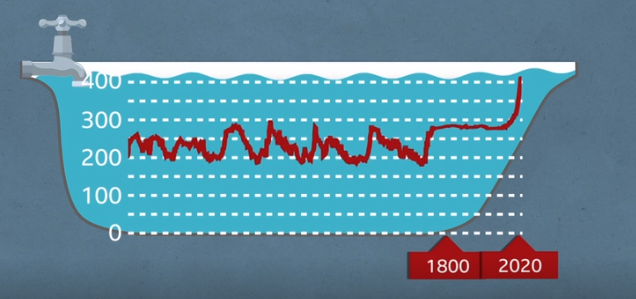Flying is not the problem, its greenhouse gas emissions are the problem. Some new companies are developing planes that do not rely on fossil fuels and Airbus‘s ambition is to create the world’s first zero-emission commercial aircraft by 2035. Decarbonising aviation is vital to the future of the travel and tourism sector. The aviation sector needs to decarbonise itself, and it is demonstrably failing to make progress fast enough. This failure jeopardises the future of travel and tourism for the outbound industry and destinations.
COP26 is the opportunity for aviation to be brought under the control of the United Nations Framework Convention on Climate Change UNFCCC.
WTM, as part of its Platform for Change, has published Time for Effective Action to Remove Greenhouse Gas Emissions from Aviation.
Today is Earth Day, a day to think about our spaceship Earth. When we look up, whether on a sunny day or at night, we see limitless space. It is, of course, an illusion. Life on our planet, our life on our planet, is dependent upon our atmosphere. The breathable part of it is about ten miles thick. We have known about the problem since 1859 when John Tyndall published the first of a series of studies on the way greenhouse gases, including carbon dioxide, trapped heat in the Earth’s atmosphere. Tyndall had demonstrated the physical basis of the greenhouse effect. And he knew the implications. He wrote: ‘Thus the atmosphere admits of the entrance of solar heat but checks its exit, and the result is a tendency to accumulate heat at the surface of the planet.’ He realised that the accumulation of greenhouse gases in our atmosphere would change our climate.
We have cause and effect for global warming. If there are other natural causes, we can only address the emission of greenhouse gasses we cause. In 1979, James Lovelock published Gaia: A New Look at Life on Earth, revealing how “for much of the past 3.8 billion years, a holistic feedback system has played out in the biosphere, with life forms regulating temperature and proportions of gases in the atmosphere to life’s advantage”. more The science is clear.
The industrial revolution was fuelled by fossil fuels, the burning of which has destabilised the positive feedback loops that have sustained life on Earth. The physicists have known about the causal relationship between greenhouse gases and climate change since 1859, 160 years, five generations. The Intergovernmental Panel on Climate Change (IPCC) was established in 1988 to provide policymakers with regular scientific assessments on the current state of knowledge about climate change, reporting into the UN System through UNEP and the World Meteorological Organization.
When we look up into the sky, our atmosphere appears to be limitless on sunny days or cloudless nights. It is not. Greenhouse gas emissions accumulate in the atmosphere and cause global warming. It is not sufficient to be carbon neutral by 2050. Greenhouse gases accumulate in the atmosphere and climate change results. Like a bathtub filling faster than is empties, the concentration of CO2 in out atmosphere is increasing.

Watch the BBCNews video on COVID and Climate Change.
We heard a great deal about how greenhouse gas emissions had slowed during the epidemic. In fact, as the data from the Mauna Loa Observatory on Hawaii demonstrates, they continued to increase. In January 2020 atmospheric CO2 was 413.39ppm in January 2021 it was 415.28ppm. The Climate Action Tracker provides an independent scientific analysis that tracks government climate action and measures it against the Paris Agreement objective of “holding warming well below 2°C, and pursuing efforts to limit warming to 1.5°C”. A collaboration of two organisations, Climate Analytics and New Climate Institute, the CAT has been providing this independent analysis to policymakers since 2009. As at 23 July 2020 they reported that International Aviation’s performance in reducing its emissions was critically insufficient and on track for a world 4ºC warmer.
Only in the last decade has the world really begun to recognise both the scale of the threat and the need to take action. There has been a great deal of procrastination, as governments and business delay hoping that others will reduce their emissions or that there will be some low-cost solution. The UK government commissioned the Stern Review on the Economics of Climate Change which reported in 2006. The review concluded that “the benefits of strong and early action far outweigh the economic costs of not acting”. As long as the polluter does not pay for the environmental damage they cause, it is cheaper not to take action. Unfortunately, it is economically rational not to invest in a solution as the costs would fall on the business, while the costs of climate change caused by the pollution fall on all of us, and rather more on those in developing countries than those in the developed countries causing most of the pollution.
The aviation industry is the travel and tourism sector’s Achilles’ heel. Tour operators, tourism authorities, and destinations need to demand that air transport providers remove carbon and other climate-harming emissions, not just to claim green credentials but to assure the industry’s future.
Aviation is responsible for about 2.4% of the world’s CO2 emissions and 3.5% of human-induced climate change when other greenhouse gases and contrails are accounted for. In March 2020, the respected German consultancy Roland Berger forecast that if other industries decarbonise in line with current projections, aviation could account for up to 24% of global emissions by 2050 unless there is a significant technological shift.
Airlines, highly influential in the International Civil Aviation Organization, have sought to continue with Business as Usual and initially passed responsibility to their consumers to offset their emissions voluntarily. Carbon offsets are popular with some in the aviation sector because responsibility passes to the end consumer and removes any pressure for the aircraft manufacturer or the airline to reduce their emissions. And they are very cheap – too cheap. If offsets tempt you, look at the scientific arguments against them. 10 myths about net-zero targets and carbon offsetting, busted.
Aviation is pursuing a Business as Usual strategy. Since COP3 in 1997, CO2 emissions from aviation have almost doubled and currently match the 129 lowest emitting countries’ total emissions. It is presently unclear when air traffic will return to 2019 levels and whether future air traffic growth rates will be lower than in the past. Still, ICAO’s own forecasts suggest that without more effective action damaging emissions from air transport will at least double 2019 levels by 2050.
Sustainable Aviation Fuels (SAF), with “drop-in” capability for existing aircraft types, are currently being widely promoted as a solution for emissions mitigation. But the vast majority are biofuels, most of which do not deliver when assessed on a full life-cycle basis and emissions reduction over kerosene (an exception is advanced biofuels from waste feedstock, which face increasing limitations of supply as efforts continue to reduce waste). more
Aviation should be taxed the same as fossil fuels for other forms of transport. Additional taxes need to be raised to create funds to invest in zero-carbon emission aviation technologies. These are e-fuels, electric engines, hydrogen fuel systems and fuel cells. Airlines and manufacturers seek bailouts and government subsidies, but the vast majority of taxpayers fly rarely or never. The industry looks for taxpayer-funded subsidies while generally not paying taxes on the fuel it consumes or the pollution it causes.
Many Least Developed Countries, Landlocked Developing Countries and Small Island Developing States are substantially dependent on revenues from international tourism and air transport to and from their source markets. They require special treatment. They need a better mechanism for determining and realising their national interest in weighing up the benefits and costs of aviation-dependent tourism, exploring the opportunities of being more selective in the market when air ticket prices start to rise due to the introduction of decarbonised fuels. Developing local production of decarbonised fuels may be an option for those counties able to generate sufficient green energy creating employment, revenue and improving the balance of payments by reducing imports and potentially increasing exports. more
Position paper zero greenhouse gas emissions aviation
Chris Lyle of (Air Transport Economics, Montreal), Harold Goodwin (Responsible Tourism Network, London) and Paul Peeters joined forces to write a short Position paper about zero greenhouse gas emissions aviation (link). Aviation is one of the ‘hard to abate’ sources for CO2 and greenhouse gases causing climate change. Only few options exist to reduce the emissions from air travel to zero. The paper describes such a scenario and provides recommendations for policymakers and then industry.
Download the position paper here
Want to receive the latest Responsible Tourism news? Sign up to our newsletter and opt in for updates about this category.
Nominations for the Responsible Tourism awards are now open, and this time they’re global. They’re free to enter, and the deadline is 31 August 2021. Categories include: Decarbonising Travel & Tourism, Sustaining Employees and Communities through the Pandemic, Destinations Building Back Better Post-COVID, Increasing Diversity in Tourism: How inclusive is our industry?, reducing Plastic Waste in the Environment and Growing the Local Economic Benefit.



Harold You are rigbt. I have been calling for a zero ghg 2050 Aviation “Moonshot” since 2015. Humanity needs “no adverse climate impact” flight to connect. Its too important to sacrifice to traditional lobbyists. Some vested interests argue that SAF is too expensive… Which is false logic…. If ticket prices rise to pay for ghg elimination so be it. Our kids deserve better. Geoffrey